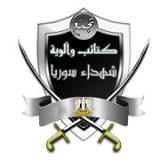Syrian Martyrs' Brigades
| Union of Martyrs of Syria Battalions and Brigades | |
|---|---|
| تجمع كتائب وألوية شهداء سوريا | |
 Official logo of the Syrian Martyrs' Brigade | |
| Leaders |
|
| Dates of operation | 15 December 2011 – 5 May 2015 |
| Group(s) | Martyrs of Mount Zawiya Battalion[2] |
| Headquarters | Jabal Zawiya, Idlib Governorate, Syria |
| Active regions | Syria |
| Size | 7,000[2]–12,000[3] |
| Part of | Free Syrian Army[4] Syria Revolutionaries Front[5] |
| Allies |
|
| Opponents |
|
| Battles and wars | Syrian Civil War |
| Designated as a terrorist group by | |
The Syrian Martyrs' Brigades, full name Union of Martyrs of Syria Battalions and Brigades (Arabic: تجمع كتائب وألوية شهداء سوريا), was a unit of the Free Syrian Army and the Syria Revolutionaries Front which was active in the Idlib Governorate. The unit was formed early during the Syrian Civil War in order to fight against the Syrian Government.
Background

The Martyrs of Mount Zawiya Battalion was formed on 15 December 2011, operating from the 33 villages that make up the rural Jabal Zawiya region south-west of Idlib.[1] Unlike the other major rebel group that operates out of Jabal Zawiya, Suqour al-Sham, the Martyrs of Mount Zawiya Battalion has been tied closely to the Idlib Military Council, a provincial-level military structure that integrates different rebel groups.[1] By July 2012, as the group expanded its size and operating territory from the Turkish border in the north to Hama in the south, it had changed its name and merged with other groups.[2]
The group was led by Jamal Maarouf[7] (also known as Abu Khalid), who once hunted and worked in construction, and was one of the first men in the area to take up arms against the Syrian security forces,[8] the group has grown to become one of the largest rebel factions in Idlib Governorate.
The Syrian Martyrs' Brigades has traditionally relied on its support from local communities,[3] and much of their weapons has been captured from government forces or purchased from corrupt army units,[9] but it has been reported that the group also receives funds and weaponry from Saudi Arabia.[7][10]
Popular support for the Martyrs' Brigades dwindled throughout much of 2013 due to the groups perceived lack of any defined ideology and allegations of criminality from rival rebel groups. In December 2013 Maarouf and his group became the leading figures in a new rebel alliance called the Syrian Revolutionaries Front.[11]
Activity
After placing the Syrian Air Force base at Abu al-Duhur under siege, the Syrian Martyrs' Brigades were credited with downing two MiG-21 and one MiG-23 jet fighters in August and September 2012, including one reportedly shot down by Maarouf himself.[9]
In January 2014, the Syrian Martyrs' Brigades killed Haji Bakr, a senior military commander in the Islamic State of Iraq and the Levant group.[12]
Ideology
Unlike the Islamist Suqour al-Sham, the Martyrs of Mount Zawiya Battalion had been described as not motivated by any particular ideology, although the leadership came from a background of Sunni Muslim observance and traditional rural values.[3] The groups subunits were often named after Syrian nationalist figures rather than Islamic ones.[13] Maarouf did not advocate an Islamic state, and was wary of Islamist groups, however his group cooperates with them on the battlefield.[3]
See also
References
- ^ a b c d "Rebel Groups in Jebel Al-Zawiyah" (PDF). Institute for the Study of War.
- ^ a b c "Syria's rebels Who will come out on top?". The Economist. 11 August 2012. Retrieved 17 December 2013.
- ^ a b c d "Rebels With a Cause, But Not Much Consensus". Foreign Policy. 1 October 2012. Archived from the original on 17 October 2012. Retrieved 17 December 2013.
- ^ "A day with the Free Syrian Army". Al Arabiya. 29 December 2012. Retrieved 17 December 2013.
- ^ "FSA alliance pushes back against Islamic Front". The Daily Star. 17 December 2013. Retrieved 17 December 2013.
- ^ "List of terror groups published by UAE". gulfnews.com.
- ^ a b Yehuda U. Blanga (Winter 2017). "Saudi Arabia's Motives in the Syrian Civil War" (PDF). Middle East Policy. XXIV (4).[dead link]
- ^ "Where the Rebels Rule Syria's Boys of Summer". Al Monitor. 14 August 2012. Retrieved 17 December 2013.
- ^ a b "Rebels Make Gains in Blunting Syrian Air Attacks". New York Times. 26 September 2012. Retrieved 17 December 2013.
- ^ "Syria's Secular and Islamist Rebels: Who Are the Saudis and the Qataris Arming?". Time Magazine. 18 September 2012. Retrieved 17 December 2013.
- ^ "The Frontman vs. al Qaeda". Foreign Policy. 11 March 2014. Retrieved 15 March 2013.
- ^ "ISIS confirms death of senior leader in Syria". Long War Journal. 5 February 2014. Retrieved 23 October 2014.
- ^ "Inside Syria's Fracturing Rebellion". The New Republic.
External links
- Syria Behind the Lines, a PBS Frontline documentary featuring the brigade
- The Bombing of al-Bara, a dramatic, online film that documents the moment Mahrouf's meeting is almost hit by a government air strike
